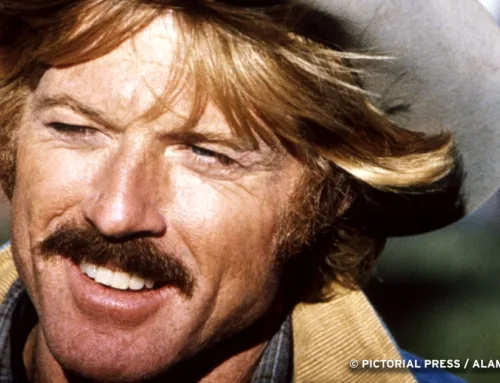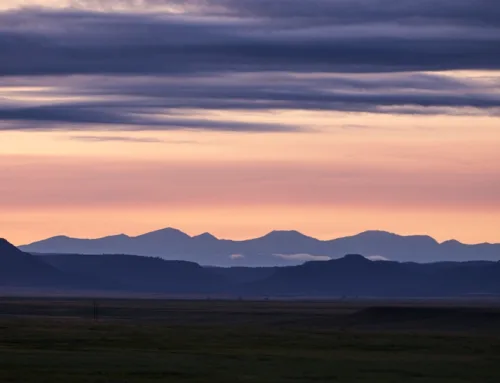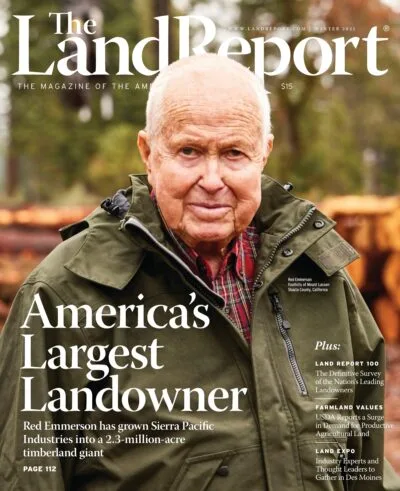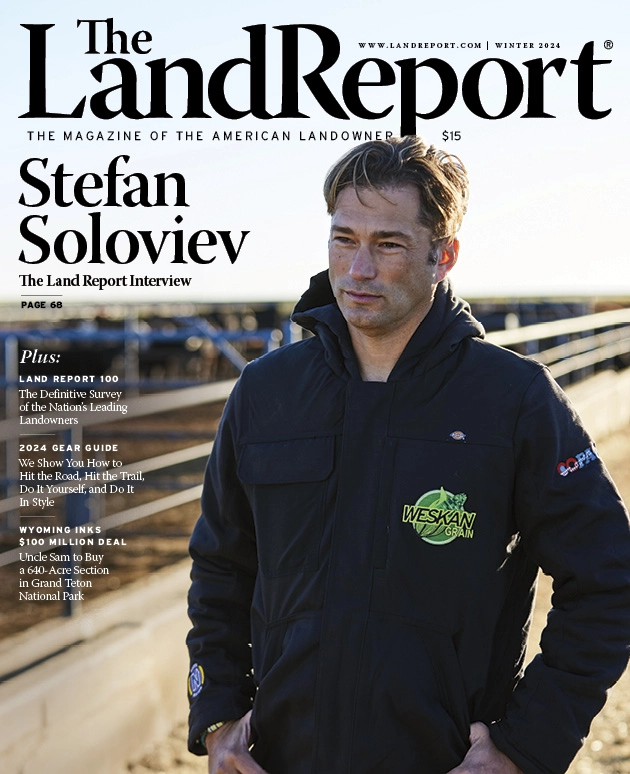Dawn Buckingham Creates the Yellowstone of Texas
Dawn Buckingham Creates the Yellowstone of Texas
By Eric O'Keefe
Photography By Kyle Mashburn & Laurence Parent
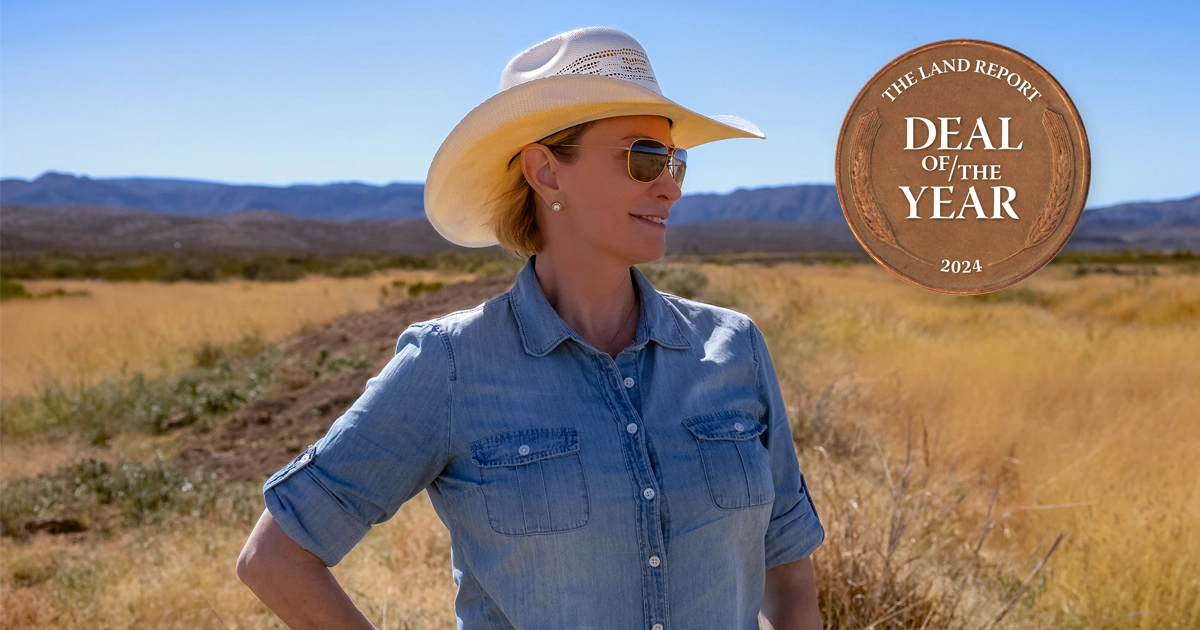
LR_DawnBuckingham-01-wDoY
ONLY IN TEXAS. Texas General Land Office Commissioner Dawn Buckingham eyes the Brewster Ranch. © Kyle Mashburn / Texas GLO
With the stroke of her pen, Dawn Buckingham has created the Yellowstone of Texas. On October 24, the Texas General Land Office, under Buckingham’s leadership, acquired a massive block of classic Big Bend Country in Far West Texas — 353,785 acres — on behalf of the state’s $57 billion Permanent School Fund. Originally listed for $975 per acre, Brewster Ranch sold to Texas’s oldest state agency for $465 per acre. The $164.6 million purchase was the largest single transaction in the Greater Big Bend Ecosystem since 1943, when Texas gifted Big Bend State Park to the federal government.
The 2024 Land Report Deal of the Year does far more than permanently protect the 552 square miles of untamed Old West encompassed by Brewster Ranch. It ensures that the Greater Big Bend Ecosystem, a multimillion-acre mosaic of public and private lands known for centuries as el despoblado — “the land without people” — remains the same as when Spanish explorers first saw it centuries ago.
Pioneer Heritage
Texas General Land Office (GLO) Commissioner Dawn Buckingham, MD, identifies with the concept of way back when. Buckingham has traced her family’s Texas heritage back nine generations to a league of land west of Houston known as Bailey’s Prairie.
When James “Brit” Bailey (1779–1832) arrived in 1818, Texas was a far-flung Spanish outpost. Madrid was its capital — Austin wouldn’t exist for another 20 years — and Ferdinand VII was its sovereign. Three years after Bailey staked his claim, Moses Austin received a permit to settle 300 families; in essence, Buckingham’s ancestor preceded the Old Three Hundred, those settlers who received land grants from Moses’s son, Stephen F. Austin.
“I love Texas, and it’s really rural Texas that is Texas to me. That’s where our values come from,” Buckingham tells me during our May 6 interview.
That sentiment became apparent to James King — himself a direct descendant of Captain Richard King of King Ranch fame — while he was touring Buckingham and her team from the GLO along a scenic stretch of San Francisco Creek.
“We were in the middle of a four-hour helicopter tour when we landed along San Francisco Creek,” King says. “Helicopter tours are funny. When you’re upstairs, the land can come off as two-dimensional. After we landed, the commissioner walked over to San Francisco Creek by herself. That’s when it happened. That’s when I think she got the magnitude of that place.”
Buckingham concurs.
“You just can’t believe how beautiful it is,” she says. “There are canyons, ravines, and places that are so remote that few people have even seen them in the past 100 years.”
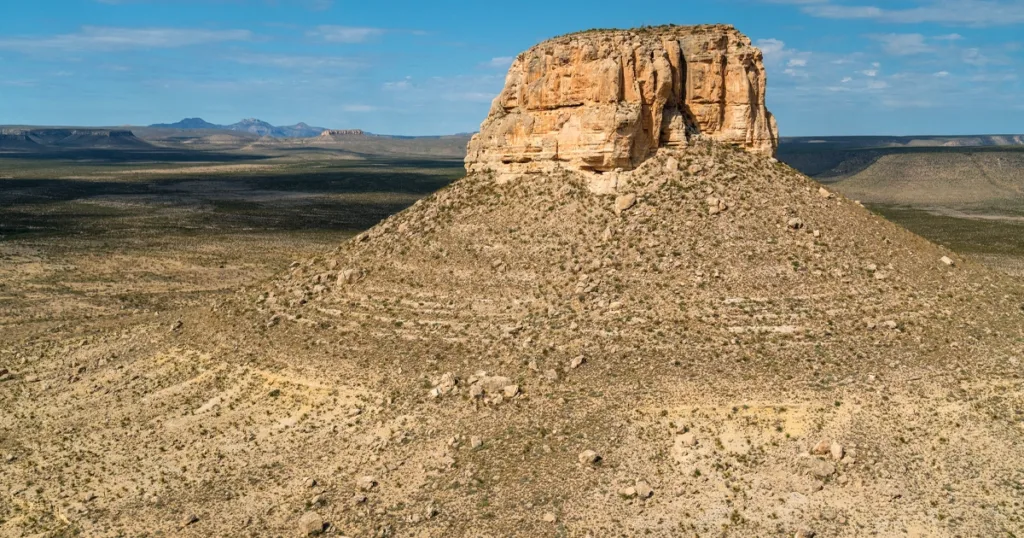
TRANS-PECOS. Scant evidence of mankind exists on this huge expanse west of the Pecos River and north of the Rio Grande River.
A Short History of a Large Ranch
The most intriguing aspect of the largest ranch sale in the United States in 2024 was that it actually did not involve a single ranch; it involved dozens of ranches with scores of headquarters, countless hunting camps, an assortment of airstrips, and hundreds of miles of dusty dirt roads that crisscross South Brewster County.
Yet there never was an actual Brewster Ranch. Its headquarters doesn’t appear on a topographic map, and its brand was never registered at the Brewster County Courthouse in Alpine.
Credit Harrison King for “branding” the Brewster Ranch. An eighth-generation Texan, the King Land & Water agent and his father, James, shared the Brewster Ranch listing, an ever-evolving project that expanded and contracted as existing components were sold and new ones were bought. Point of fact: At its height, Brewster Ranch totaled 422,952 acres.
Yet until 2001, it did not exist. That’s the year Brad Kelley acquired a remote 17,542-acre tract in Brewster County’s Santiago Mountains. Known for more than a century as the Matthews-Law Ranch, the historic holding became the first of 78 separate deeds that the Land Report 100er ultimately acquired. In 2023, Kelley took title to the last component of Brewster Ranch, 6,500 acres along Maravillas Creek. During the intervening 22 years, the Kentucky native not only created a cattle kingdom; he also turned back the hands of time one deed at a time by reassembling portions of historic outfits that had been carved up and sold off long ago, including pioneering ranches once owned by Alfred Gage and Asa Jones.
“I call Brad ‘the antifragmentation machine,’ ” James King says. “Brad bought historic ranches that had been divvied up and aggregated them into much larger properties.”
By 2019, Kelley had acquired hundreds of thousands of acres in Brewster County. (He was also ranked No. 9 on the 2019 Land Report 100 with 1,139,984 acres.) Kelley decided that it was time to go to market, and he listed the easternmost component of Brewster Ranch, Rio Texico Ranch, with King Land & Water for $85.995 million. (See Land Report Texas 2019.)
“We started with ‘just’ 117,000 acres,” says Harrison King. “The idea was that offering a single ranch in excess of 100,000 acres would be incredibly unique. And it definitely was. The following year, we decided to blow everyone away and get their attention by listing the entire ranch.”
The choice of “Brewster Ranch” not only honored Brewster County, it also paid tribute to the fact that Texas’s largest county is in fact bigger than the state of Connecticut. Not surprisingly, the 420,000-acre listing made waves worldwide. (See Land Report Texas 2020.) “Most people didn’t know a ranch that big existed outside of the historic heritage ranches,” Harrison King says.
By 2024, the father-and-son duo had worn out two trucks showing the massive cluster of ranches some 20 times. Each showing was typically a two-day undertaking; prospective buyers flocked to Far West Texas from Africa, Australia, Europe, across the United States — and of course, Texas. There were bitcoin miners and cattle ranchers. One had designs on a self-contained metropolis. Another set his sights on a theme park along the lines of Westworld. A third saw none of the above. She saw revenue.
She became the buyer.
Hiding in Plain Sight
Dawn Buckingham may well be the most accomplished politician you’ve never heard of. Let’s begin with the most daunting aspect of her résumé: The commissioner of the Texas General Land Office is an oculoplastic surgeon. (I had no idea what this specialization was either.)
According to the Mayo Clinic, an oculoplastic surgeon is an ophthalmologist who has completed “additional fellowship training in the medical and surgical management of a wide range of conditions affecting the structures that surround the eye, including the eyelids, eye socket, and tear-drainage system.” Aye aye.
After earning her undergraduate degree from the University of Texas at Austin (where she met her future husband, Ed Buckingham), she and her husband earned medical degrees from the University of Texas Medical Branch at Galveston and settled in Austin.
In 2016, the practicing eye surgeon became the first Republican elected to the Texas State Senate from Travis County. Six years later, when then GLO Commissioner George P. Bush announced that he would not seek re-election, Buckingham threw her hat in the ring. She defeated her Democratic opponent, Jay Kleberg, in the general election with 56 percent of the vote.
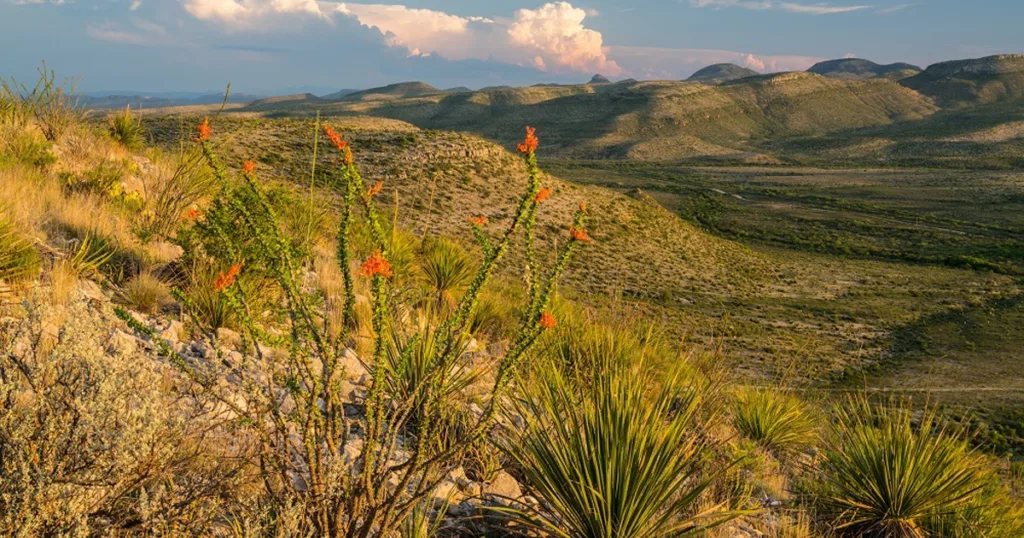
NORTHERN CHIHUAHUAN DESERT. Year-round springs bring life to this rugged canyon country.
The Agency No One Knows
Few people are aware that the Texas General Land Office even exists. Yet it is a financial powerhouse that oversees the $57 billion Permanent School Fund, manages 13 million acres, owns the most mineral rights in a mineral-rich state, and just happens to be the caretaker of the shrine of Texas liberty, the Alamo.
“I like to joke that we’re the agency that positively touches millions of Texans’ lives every day, yet no one has any idea that we exist,” Buckingham says.
Founded in 1836 at the dawn of the Republic of Texas, the GLO’s original mandate was to collect and keep records, provide maps and surveys, issue titles, and manage the settlement of state lands. Those responsibilities were completely transformed when the Republic of Texas joined the Union in 1845 because the 28th state retained ownership of vast stretches of its national lands. Today, those state-owned lands generate billions in revenues annually for Texas school children via the Permanent School Fund. That fund was a principal driver for the purchase.
“This piece of property is going to generate revenue,” she says.
Buckingham is a proven performer in this regard. Less than two years into her term, she inked a carbon capture and sequestration (CCS) transportation and storage lease with ExxonMobil Low Carbon Solutions that generated $130 million for the Permanent School Fund on day one. That nine-figure payday was just the beginning. The ExxonMobil lease has the potential to generate billions (not millions) for the Permanent School Fund over the next decade.
During our interview, Buckingham analyzed the upside of the Brewster Ranch purchase by ticking off a lengthy list of potential revenue streams: “… with the groundwater plays, with soil carbon sequestration, with pore space carbon sequestration, the opportunities for environmental tourism, for hunting … there are so many things,” she says.
In addition to dollars and cents, Buckingham is adamant about using her office to secure Texas and Texans. Two counties downriver from Brewster Ranch, Sun Guangxin spent more than $100 million acquiring 140,000 acres. The Chinese national’s purchases not only set off alarm bells in Val Verde County, home of Laughlin Air Force Base, but they also triggered the unanimous passage of the Lone Star Infrastructure Protection Act in the Texas House and the Texas Senate.
Then a state senator, Buckingham joined her colleagues in prohibiting Texans from entering into contracts with businesses or government officials from China, Iran, North Korea, and Russia. Buckingham is adamant about “the border-security component to this property, as well as the fact that we’re going to be darn sure that China is not going to buy up big portions of Texas. So everything we can do to protect the Texas we know and love, we’re going to do it.”
The GLO once had a considerable presence in Brewster County. More recently, the agency’s holdings shrank to 42,000 acres. “There are so many reasons to own surface now. The General Land Office used to own a lot more surface in Brewster County. We’re down to just a fraction of what we used to own in the original days because some land commissioners sell surface and some land commissioners see the importance of surface,” Buckingham says.
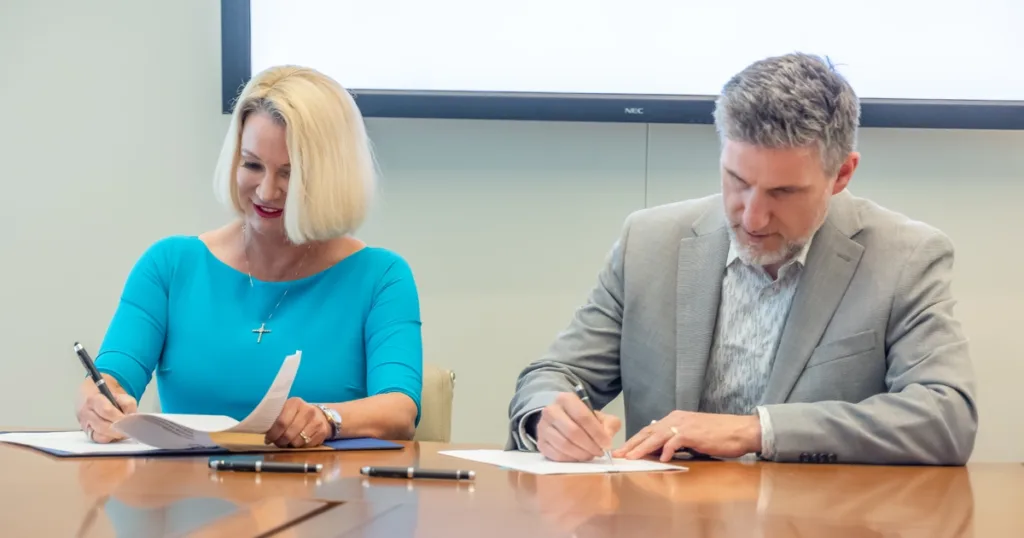
$130 MILLION ON DAY ONE. Buckingham executes a 271,068-acre carbon sequestration lease with Dominic Genetti of ExxonMobil Low Carbon Solutions on October 10, 2024. The record-setting lease netted a nine-figure payday for the Permanent School Fund and has the potential to generate billions more.
Closing the Deal
Given that buying and selling land is standard operating procedure for the Texas GLO, the go-forward followed a well-established protocol.
“We have a pretty rigorous process for purchasing property or making investments,” the commissioner says. “First of all, it has to be vetted by my team. Then it goes through an independent advisory committee, which is a group of people with expertise in real estate financial matters. Then it ultimately comes to the School Land Board, which I chair and which also includes four appointees by Governor Abbott. Everyone agreed that Brewster Ranch was a game changer, a must-do for the Texas schoolchildren for many reasons.”
J.P. Bryan was one of the most vocal supporters on the investment advisory committee. In addition to owning the Chalk Draw and Maravillas Ranches in Brewster County, the Houston energy entrepreneur acquired the Gage Hotel in Marathon in 1978.
“I have a great affection for West Texas and our special area around Marathon, Alpine, and Marfa. I think it’s like none other in the United States in very dramatic ways. And the best thing we can do for that country is try to keep it exactly like it is and let people see it as it has been since the time when the Comanches rode down the Great Comanche War Trail,” Bryan says.
Like Buckingham, Bryan didn’t consider Brewster Ranch to be a one-dimensional asset.
“We just don’t save a piece of land. We save the soul of the community and give inspiration to people who want to come and look at it and see it and enjoy it. That’s our real challenge here: to find that balance between economic growth and good stewardship of one of the most sensitive areas of our entire state from the things that could easily destroy it,” Bryan says.
Eric DeJernett of CBRE Group in Austin and Sam Middleton of Chas. S. Middleton and Son in Lubbock were brought on board to represent the Texas General Land Office.
“Those guys played critical roles,” James King says. “Eric knows the ins and outs of working with the General Land Office, and no one knows big ranches in Texas better than Sam.”
Ultimately, the many talented teams crafted a deal. A very big deal. The transaction closed on October 24. From the GLO’s perspective, the Brewster Ranch acquisition was a win on many levels.
“It’s really exciting when we can step in and help the schoolchildren of Texas financially but also, at the same time, protect very important ecosystems and the last uninterrupted viewshed in Texas,” Buckingham says.
For those drawn to the allure of el despoblado and the vitality of the Greater Big Bend Ecosystem, the acquisition of Brewster Ranch and its ultimate preservation ranks as a win that will echo down through the ages.
“It’s an awesome, rugged, wild piece of Texas, and it deserves to be together,” says James King. “I’m floored by the commissioner’s ability to put together a transaction like that because something like this doesn’t happen every day. It is very seriously difficult for an agency to get the political support as well as dedicate the financial resources to do something like buy Brewster Ranch.”
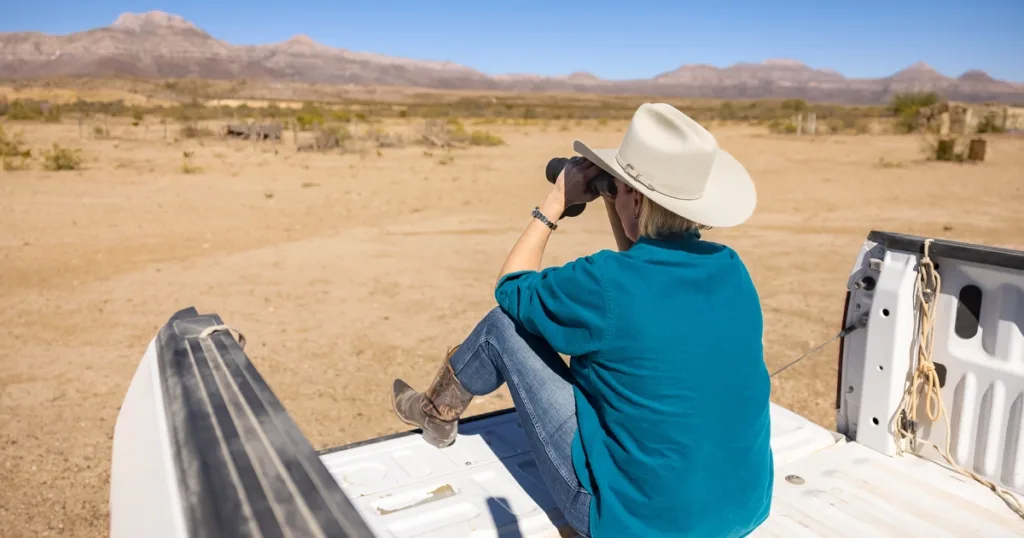
AN AWESOME, RUGGED WILD PIECE OF TEXAS. The commissioner of the Texas General Land Office focuses on the pine-studded Shely Peaks.
Published in The Land Report Spring 2025.


